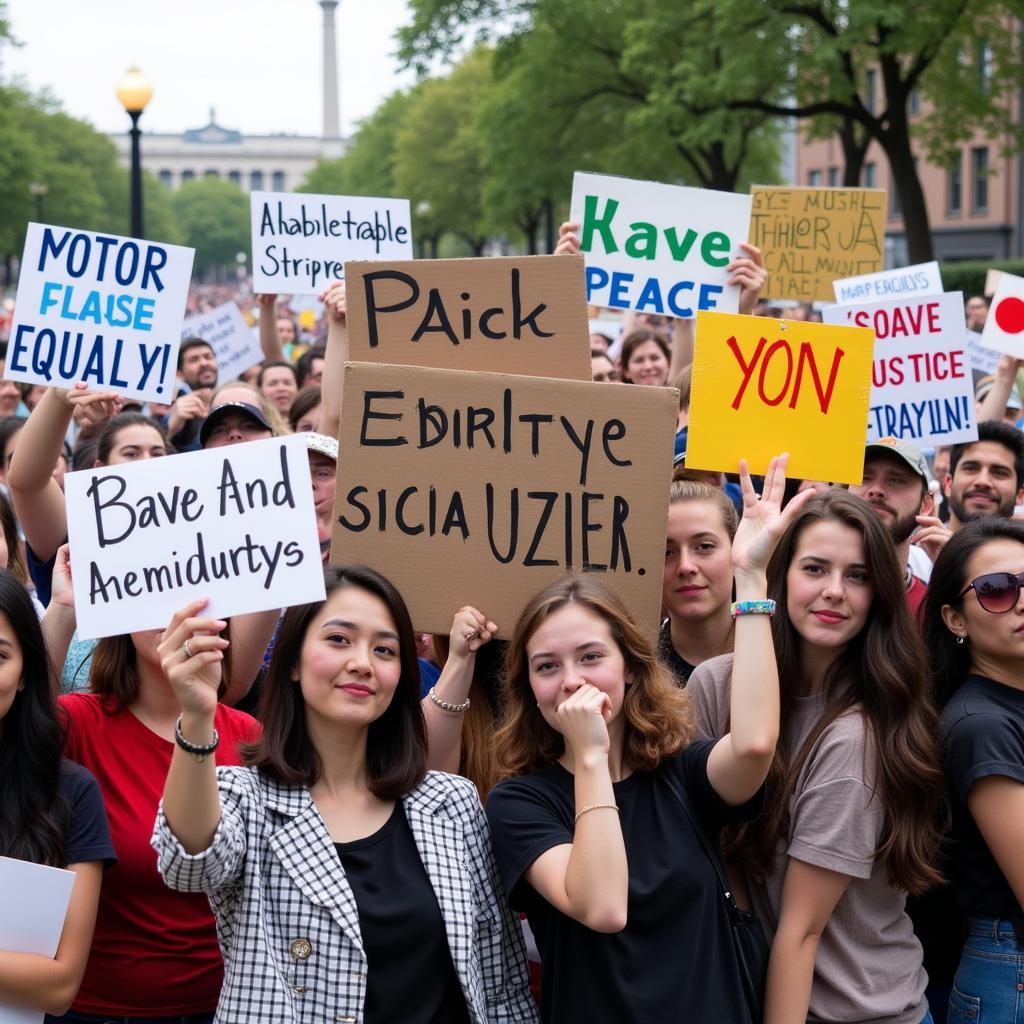Communication In A Civil Society is the lifeblood of democracy, understanding, and ultimately, peace. It’s the bridge that connects diverse perspectives, fostering empathy and enabling collaborative problem-solving. Without open and honest dialogue, societies fracture, mistrust festers, and the path to conflict becomes tragically easier to tread. Effective communication is not merely the exchange of words but the creation of shared meaning, fostering respect and a willingness to understand the “other.” This article explores the critical role communication plays in building and maintaining a peaceful civil society.
Just after the opening of the Berlin Wall, there were many stories of people struggling to communicate effectively. This highlights the importance of consistent and open dialogue even within seemingly homogenous societies. Learn more about society and its impact at H v Society.
The Power of Dialogue: Building Bridges Across Divides
Open dialogue is the bedrock of a civil society. It allows for the expression of diverse opinions, fostering a sense of belonging and shared ownership. When individuals feel heard and respected, they are more likely to engage constructively in the political and social processes that shape their lives. This open communication creates an environment where differences can be acknowledged, understood, and even celebrated. Dialogue creates opportunities for learning and growth, strengthening the bonds within a community and promoting peaceful coexistence.
Fostering Empathy Through Active Listening
Active listening goes beyond simply hearing words. It involves genuinely trying to understand the perspective of the other person, acknowledging their feelings, and responding with empathy. Active listening encourages mutual respect and understanding, paving the way for productive conversations even when disagreements arise. It fosters trust, which is essential for resolving conflicts peacefully. It requires setting aside preconceived notions and judgments and approaching each conversation with a genuine desire to connect.
 Active Listening in a Civil Society
Active Listening in a Civil Society
Navigating Disagreements: Communication as a Tool for Conflict Resolution
Disagreements are inevitable in any society. However, the way these disagreements are navigated determines whether they escalate into conflict or become opportunities for growth and understanding. Effective communication equips individuals with the tools to express their concerns constructively, find common ground, and negotiate solutions that benefit all parties involved. It promotes a culture of respect and understanding, even when there are strong differences of opinion. Learn more about the complexities of societal conflict at Man vs Society The Most Dangerous Game.
The Importance of Non-Violent Communication
Non-violent communication (NVC) is a powerful framework for resolving conflict peacefully. It emphasizes empathy, compassion, and honest self-expression. By focusing on needs and feelings rather than blame and judgment, NVC allows individuals to connect on a deeper level and find solutions that address the root causes of conflict. It encourages active listening and promotes mutual understanding, creating a space for collaborative problem-solving.
Building a More Inclusive Society: Communication’s Role in Social Justice
Communication plays a vital role in promoting social justice. By giving voice to marginalized communities, it exposes inequalities and challenges discriminatory practices. Open and honest dialogue about social issues can raise awareness, inspire action, and drive positive change. It creates a platform for marginalized groups to share their experiences, fostering empathy and understanding among the wider community. Further exploration of societal structures can be found at Mohawk Warrior Society.
The Role of Media and Technology
In today’s interconnected world, media and technology play a significant role in shaping public discourse. They have the power to amplify marginalized voices, spread awareness about social issues, and mobilize action for change. However, they can also be used to spread misinformation, promote hate speech, and exacerbate existing inequalities. Responsible and ethical use of media and technology is crucial for fostering a more just and peaceful society.
Conclusion: Communication in a Civil Society – A Path to Peace
Communication in a civil society is not merely a desirable trait; it is a fundamental necessity for building a more peaceful and just world. It empowers individuals, strengthens communities, and fosters understanding across cultures. By embracing open dialogue, active listening, and non-violent communication, we can bridge divides, resolve conflicts peacefully, and create a world where everyone feels heard, respected, and valued. Communication in a civil society truly is the cornerstone of peace. For more perspectives on social structures and communities, explore Helena The Society.
FAQ
- What is the role of communication in conflict resolution?
- How can active listening improve communication in a civil society?
- What are some examples of non-violent communication?
- How can technology be used to promote peace and understanding?
- What are the challenges to effective communication in a diverse society?
- How can we encourage more open dialogue in our communities?
- What is the relationship between communication and social justice?
 Communication and Social Justice in Civil Society
Communication and Social Justice in Civil Society
You can find further insights on achieving academic excellence within a society at National Latin Honor Society.
When you need support, please contact Phone Number: 02043854663, Email: [email protected] Or visit us at: Area 34, Bac Giang, 260000, Vietnam. We have a 24/7 customer service team.